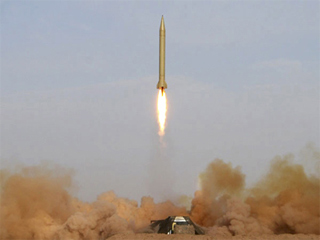
Ahmadinejad is running for re-election in a June 12 vote and has been criticized by his opponents and others for antagonizing the US and mismanaging the country's faltering economy.
Most Western analysts believe Iran does not yet have the technology to produce nuclear weapons, including warheads for long-range missiles. A group of US and Russian scientists said in a report issued Tuesday that Iran could produce a simple nuclear device in one to three years and a nuclear warhead in another five years after that.
The study published by the nonpartisan EastWest Institute also said Iran is making advances in rocket technology and could develop a ballistic missile capable of firing a 2,200-pound nuclear warhead up to 1,200 miles "in perhaps six to eight years."
Iran says its missile program is merely for defense and its space program is for scientific and surveillance purposes. It maintains that its nuclear program is for civilian energy uses only.
The solid-fuel Sajjil-2 surface-to-surface missile is a new version of the Sajjil missile, which Iran said it had successfully tested late last year with a similar range.
Iran's nuclear and missile programs have alarmed Israel, and the country's new prime minister, Benjamin Netanyahu, pressed Obama to step up pressure on Tehran when the two met in Washington on Monday. Ahmadinejad has repeatedly called for Israel's elimination, and the Jewish state has not ruled out a military strike to deal with the Iranian nuclear threat.